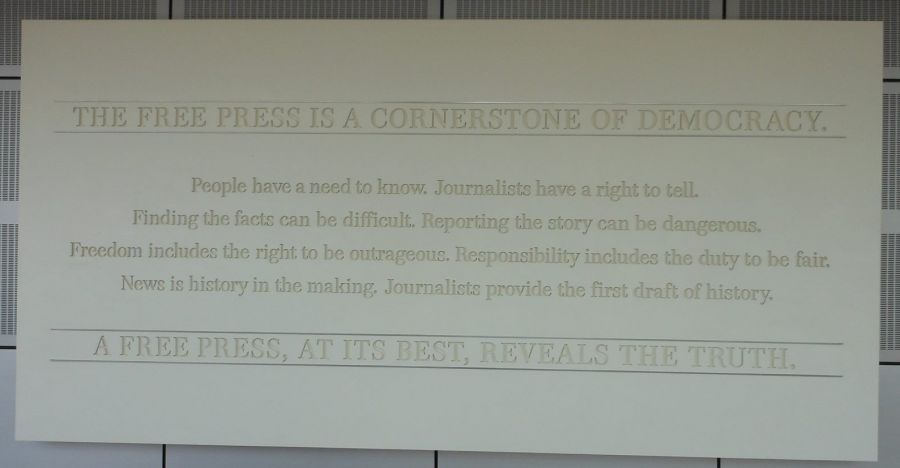Letters invigorate editorial pages but demand scrutiny
Jim Pumarlo
May 1, 2023


I’ve long regarded editorial pages as the conscience of a community. Nothing better represents the marketplace of ideas than a rich exchange of letters.
At the same time, editorial pages should not be a free-for-all. Guidelines must be set.
Letters demand as much — if not more — scrutiny than other news and editorial content. Monitoring letters requires diligence. Most editors can relate to the challenges during election season with organized campaigns by candidates and a variety of ballot initiatives. “Free” letters are strategically used to supplement — and, in the worst cases, replace — paid advertising.
Unfortunately, such campaigns are becoming commonplace year-round. The hyper-partisanship of politics has injected national debates into local public policy. Vitriolic letters prompt editors to pause.
The extra time and attention devoted to screening letters was underscored in a recent exchange on the International Society of Weekly Newspaper Editors hotline. It’s understandable that editors are wary of publishing letters with inflammatory language or opinions that could offend some segment of readers.
At the same time, don’t dilute editorial pages. Letters must be substantive and should express opinions. Milquetoast letters and editorials are bland and meaningless. They are easily forgotten, often dismissed within minutes of reading.
Newsrooms must craft guidelines that align with their specific operations and communities. There is no one-size-fits-all policy. Some ideas follow.
Give priority to local opinions: In general, accept letters from local readers only. An exception might be a letter on a local topic from a recognized expert who lives outside the area.
Reject mass-produced letters: Mass-produced letters — even if submitted by a local resident — should be rejected. Yes, you’ll never catch all the letters that follow a template, but a sharp eye often can catch those letters submitted verbatim to newspapers across the country.
Reject thank-you letters: Publication of “thank you” letters weakens the letters column. Exceptions arise, of course, such as in the case of a stranded out-of-town motorist who wants to pass along appreciation for the after-hours assistance by a local service station. In most instances, however, these letters are a shortcut for organizations that seek to save the time, and sometimes expense, of writing personal notes to individuals who contributed to the success of an event.
Limit length: Readers have limited attention for lengthy stories. The same is true for letters. Editors are doing writers a favor by imposing limits; 350 words is one starting point.
Limit frequency of authors: Consider limiting individuals to one letter per month, except in the case of rebuttals.
Be ready for rebuttals: Exchanges among writers in the print edition should be limited to two letters from each individual on a particular subject — in other words, a letter and a rebuttal, plus a counter-rebuttal from each writer. After that, individuals can carry on conversations privately. Writers will complain that the other person had the last word, but that always will be the case. Online commentary affords the opportunity for immediate and frequent exchange.
Don’t accept letters as substitutes for news stories: Only in special circumstances should editors accept letters promoting an event or program. Once you say “yes” to one, it’s nearly impossible to say “no” to another.
Be conscious of display: Be sensitive to the prominence letters receive — how they are displayed — especially those that present opposing views on the same subject.
Edit aggressively: Make readers aware that letters in print editions are edited aggressively, especially those with repetitive themes. Online comments often are published with minimal editing.
Stick to public issues: Letters should be restricted to public issues or issues that come before public bodies. Compliments and/or criticism of private organizations and businesses should not be regular subjects. For example, it’s appropriate to publish a letter critical of a grocery store expansion because the larger parking lot will close a street. On the flip side, letters critical of the change in franchise on the basis that shoppers now will have to bag their own groceries should be rejected.
Identify authors where appropriate: Letters should carry a note identifying the writer, if it’s germane. For example, an author might be identified as a nuclear engineer if the letter addresses nuclear energy.
Verify letters: It’s easier than ever to submit fake letters with online delivery. All letters should be verified, preferably by a phone call. Editors should require complete contact information on submissions — e.g., name, full address, telephone number and email address.
Editors should be consistent with guidelines when screening letters, but always be open to letters that warrant special consideration. Don’t miss an opportunity to write a column, explaining to readers when a letter might be worthy of an exception to policy.
Reader opinions remain the lifeblood of vibrant editorial pages. Editors should take great pains to promote a civil and respectful exchange. At the same time, don’t unnecessarily squelch comments. Be careful that you don’t let personal impressions of, or association with, an author and/or a subject interfere with an exchange.
Jim Pumarlo is former editor of the Red Wing (Minnesota) Republican Eagle. He writes, speaks and provides training on community newsroom success strategies. He is author of “Journalism Primer: A Guide to Community News Coverage,” “Votes and Quotes: A Guide to Outstanding Election Coverage” and “Bad News and Good Judgment: A Guide to Reporting on Sensitive Issues in Small-Town Newspapers.” He can be reached at www.pumarlo.com and welcomes comments and questions at jim@pumarlo.com.









